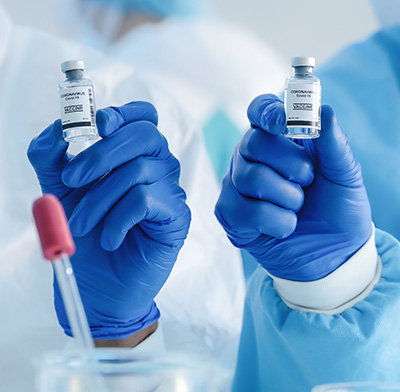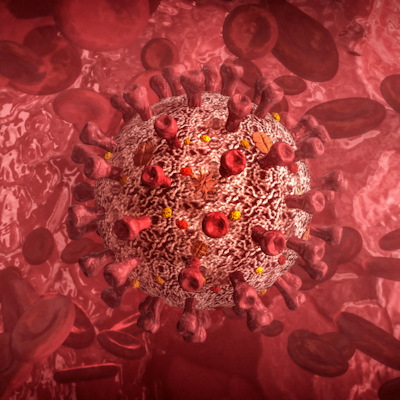December 8, 2020 -- Antibodies that develop after infection with the SARS-CoV-2 virus disappear quickly, according to an analysis published in Science Immunology on December 7. The findings could indicate that SARS-CoV-2 infection might not offer long-term immunity from subsequent reinfection with the virus.
Most individuals infected with SARS-CoV-2 develop antibodies against the virus's spike and nucleocapsid proteins, which are therefore used as antigens in clinical serology assays. The spike protein is an important target for neutralizing antibodies, as they can prevent viral entry into host cells.
There is no consensus regarding the role of antibodies in clearance from the body of the SARS-CoV-2 virus or disease severity and the durability of antibody responses over time. Some findings indicate a rapid decline of immunoglobulin G (IgG) antibodies specific to the SARS-CoV-2 virus around three months post infection, whereas others point to stable titers detected for weeks and months.
Still others suggest that virus-specific antibody responses in COVID-19 patients are higher in severe disease relative to mild or asymptomatic cases, and therefore that antibody responses may be more effective in preventing rather than resolving disease.
In the new study, researchers from Stanford University conducted a comprehensive analysis of SARS-CoV-2 antibody responses in nasopharyngeal swab and plasma samples of individuals infected with SARS-CoV-2. A total of 254 individuals (79 inpatients and 175 outpatients or asymptomatic individuals) were analyzed with real-time reverse transcription polymerase chain reaction.
In all, 828 samples were analyzed with enzyme-linked immunosorbent assay. Researchers measured changes over time in IgM, IgG, and IgA levels specific to SARS-CoV-2 in the virus's receptor-binding domain (RBD), spike protein, and nucleocapsid, as well as in the RBD-angiotensin-converting enzyme 2 (ACE2) blocking assay.
At early time points, after onset of symptoms, there was no evidence of preexisting antibodies that recognize SARS-CoV-2, suggesting that there is little cross-reactivity of SARS-CoV-2 antigens and other coronaviruses. However, most individuals seroconverted (developed IgM, IgG, and IgA antibodies specific for SARS-CoV-2 antigens) by week two after onset of symptoms.
Many of the RBD-binding antibodies reached their maximums between four and six weeks post-infection. Outpatients and asymptomatic individuals, who tended to have milder disease, showed significant and progressive decreases in SARS-CoV-2-specific antibodies after the first month of documented infection. In the study, patients with more severe disease eventually mounted higher antibody titers than those with milder disease. These patients also had higher viral loads.
The authors noted that decreasing antibody levels do not necessarily indicate that all immunity will be lost. They suggested that local mucosal antibody production in the airways could help prevent or impede SARS-CoV-2-infection upon reexposure. Additionally, the decreasing antibody levels may, over time, underestimate the proportion of people in the population who have been previously infected with SARS-CoV-2 in future seroprevalence studies.
The Stanford team found that higher ratios of IgG antibodies targeting either the spike or the RBD were more associated with clinically milder disease than those targeting the nucleocapsid protein. Moreover, RBD-ACE2 blocking antibodies and spike-pseudotyped lentivirus neutralization were well correlated with IgG specific for RBD.
As patients with mild disease or asymptomatic individuals have lower levels of SARS-CoV-2-specific antibodies, the researchers hypothesized that targeting of the antibody response between antigens might be associated with different disease severities. They found that individuals with mild disease had higher ratios of spike and RBD antibodies compared to the nucleocapsid, suggesting that early humoral immune responses focused on spike antigens may help to constrain viral infection.
However, patterns of antibody responses could not fully explain patient outcomes. Exceptions to the trend were seen in all cases. For instance, many patients recovered from their illness and were discharged from the hospital before they had formed detectable antibody responses, and individuals with moderate antibody production were seen across the full spectrum of inpatient disease severity. Furthermore, many patients who died of their disease generated high levels of antibodies and neutralizing titers.
In terms of vaccines, the authors explained that studies are still needed to determine how long antibodies elicited by vaccination will last and whether frequent boosting will be needed to maintain protection. In particular, it is necessary to compare the immunological protection from SARS-CoV-2 infection and the vaccine-induced immune responses of individuals stimulated by viral infection and individuals who become reinfected.
Gaining a comprehensive understanding of the role of antibodies in acute COVID-19 illness will also guide effective use of therapeutic convalescent plasma products and recombinant antibodies targeting SARS-CoV-2.
Do you have a unique perspective on your research related to infectious diseases or immunology? Contact the editor today to learn more.
Copyright © 2020 scienceboard.net








